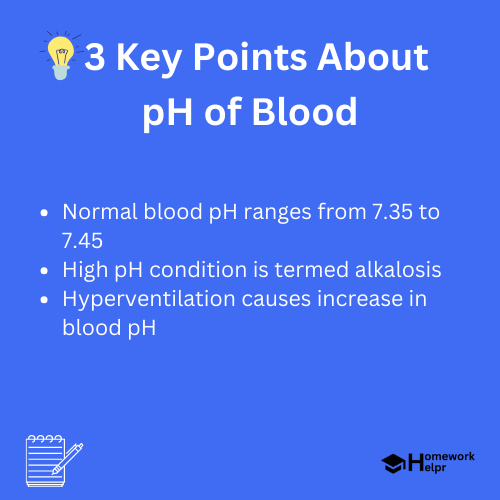📝 Summary
The pH of blood is vital for human health, with a normal range between 7.35 and 7.45. This range supports essential functions such as oxygen transport and enzyme activity. Blood pH is regulated through respiratory and renal mechanisms, along with buffer systems that neutralize acids and bases. Deviations from this normal range can cause serious health issues like acidosis (pH < 7.35) and alkalosis (pH > 7.45). High pH levels may result from factors such as hyperventilation, overdose of antacids, or diuretics, leading to symptoms like muscle spasms or confusion. Understanding blood pH is crucial for maintaining health.
Understanding the pH of Blood
The pH of blood is a crucial aspect of human physiology, reflecting the balance of acids and bases within our bodies. It is measured on a scale from 0 to 14, where a pH of 7 is considered neutral. In humans, normal blood pH ranges from 7.35 to 7.45. This slight alkalinity is essential for various biological processes, including oxygen transport, enzyme activity, and intracellular signaling.
Blood pH is maintained through a complex system involving the lungs, kidneys, and buffers in the blood. Any deviation from the normal range can lead to significant health issues. Understanding what constitutes normal blood pH and the reasons for abnormal pH levels is vital for maintaining overall health.
Normal pH of Blood
As mentioned, the normal pH of blood is between 7.35 and 7.45. This range is essential for optimal physiological function. The body employs several mechanisms to keep blood pH within this range:
- Respiratory Regulation: The lungs control the levels of carbon dioxide (CO‚ÇÇ), which can affect blood acidity. When CO‚ÇÇ builds up, it forms carbonic acid and lowers pH.
- Renal Regulation: The kidneys manage bicarbonate (HCO₃⁻) levels and excrete excess acids or bases to keep the blood pH stable.
- Buffer Systems: Buffers, such as bicarbonate and proteins, help neutralize excess acids or bases, quickly responding to changes in blood pH.
Maintaining this delicate balance is essential because even minor changes can result in significant health issues. For example, a pH level below 7.35 is referred to as acidosis, while a level above 7.45 is termed alkalosis.
Definition
Acidosis: A condition characterized by an excess of acid in the blood, resulting in a decreased blood pH.
Alkalosis: A condition characterized by an excess of base or loss of acid in the blood, resulting in an increased blood pH.
Example
For instance, if someone is having difficulty breathing, the accumulation of CO‚ÇÇ might lower their blood pH, leading to acidosis. Conversely, a person with chronic vomiting may lose acid, resulting in alkalosis.
Reasons for High pH of Blood
When blood pH rises above 7.45, it leads to a condition known as normal blood pH. High blood pH can be caused by several physiological factors that can disrupt the delicate acid-base balance in the body.
- Hyperventilation: Rapid breathing can expel CO‚ÇÇ faster than it’s produced, leading to a decrease in carbonic acid and an increase in pH.
- Overdose of Antacids: Consuming excessive amounts of antacids, which are rich in bicarbonate, can raise blood pH.
- Diuretics: Certain medications can lead to a loss of hydrogen ions and increase bicarbonate concentration, resulting in alkalosis.
These conditions can have various effects on the body, including muscle spasms, tingling in the fingers and toes, and confusion. Understanding the reasons behind high blood pH is necessary for effective treatment and management.
💡Did You Know?
Did you know that the body can tolerate a wider range of pH levels than previously thought? Recent research shows that certain organs can function within different pH environments!
In addition to the physiological responses, lifestyle factors can also play a role in blood pH. For example, a diet high in fruits and vegetables can promote a more alkaline environment in the body due to the presence of numerous minerals and compounds that reduce acid. On the contrary, a diet rich in processed foods can lead to greater acidity.
Example
An individual who engages in high-intensity exercise may experience temporary alkalosis due to hyperventilation during exercise. While this is often a normal response, monitoring the body’s pH levels can help prevent any potential adverse effects.
Conclusion
The pH of blood is a vital parameter that reflects the overall health and functional capacity of the human body. Maintaining the normal range of pH between 7.35 and 7.45 is crucial for metabolic processes, and even slight deviations can be harmful. Factors leading to high blood pH, such as hyperventilation and diet, can impose risks, yet many measures can be taken to restore balance. By understanding the complexity of blood pH regulation, individuals can make informed decisions that foster better health and well-being.

Related Questions on pH of Blood – Normal pH of Blood and Reasons for High pH of Blood
What is the normal pH range of blood?
Answer: The normal pH range of blood is between 7.35 and 7.45.
What happens if blood pH goes below 7.35?
Answer: A blood pH below 7.35 indicates acidosis, which can lead to serious health issues.
What can cause high blood pH?
Answer: High blood pH, or alkalosis, can be caused by hyperventilation, antacid overdose, or diuretics.
How can diet affect blood pH?
Answer: A diet high in fruits and vegetables can promote alkalinity, while processed foods can increase acidity in the body.
